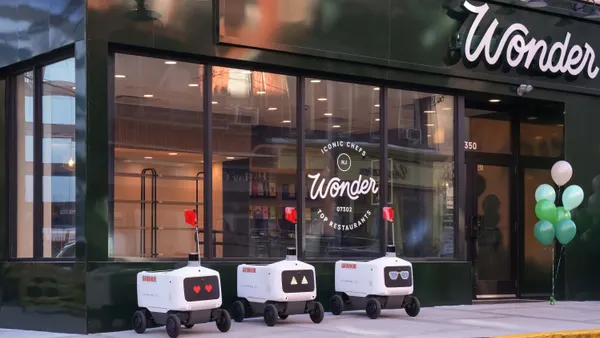Brief:
- Uber sees more than $1 billion in sales each quarter from artificial intelligence (AI) technology that helps the ride-hailing giant manage a massive amount of data gathered over the past 10 years, Jairam Ranganathan, Uber's director of product, told VentureBeat in an interview. The company's Uber Eats food delivery service has harnessed AI to reach bookings with a $6 billion annual run rate in just four years, according to Recode.
- AI helps Uber Eats comb through data on restaurant order volume, food preparation time, pickup and delivery times and driver availability to optimize deliveries. Machine learning also helps to identify restaurants that may make good Uber Eats partners based on their location, surrounding demographics and style of food, per VentureBeat.
- Uber doesn't share hard numbers on how AI affects its overall performance, but the company says it's committed to investing in the technology to match customers and drivers. That includes determining which drivers don't have a fare and can stop by a restaurant to handle an Uber Eats delivery to make extra money, VentureBeat reported.
Insight:
Uber is one of the most significant companies to come out of the smartphone era with its mix of mobile interactivity, location tracking, matching of passengers and drivers, shared reviews and payment processing. As Uber has demonstrated with its billion-dollar food delivery business, the technological infrastructure it created for moving people also can be used to support e-commerce functions like mobile food ordering, delivery and payment.
The strategy appears to be paying off, with Uber Eats quickly gaining more market share than its established rival GrubHub in 15 major U.S. cities, data analytics firm Second Measure found. Still, GrubHub was the market leader with more than half of all U.S. sales as recently as February among the biggest delivery companies, including Uber Eats, DoorDash, Postmates, Caviar and Amazon.
While Uber Eats has grown organically, GrubHub has quickly expanded through acquisitions of companies like Seamless, DiningIn, Eat24 and LevelUp. Uber Eats has taken a different strategy by piggybacking on Uber's network of cities for growth. When the company has made acquisitions, it's tended to focus on services and mobile technology. Uber Eats this year bought the virtual restaurant startup Ando and later acquired OrderTalk to better integrate its platform with restaurant POS systems.
Uber Eats last month partnered with Starbucks to start testing a delivery service at more than 100 stores around Miami. The coffee chain also started working with Postmates six years ago, and in 2015 formally partnered with the delivery startup to provide service in the Seattle area. Postmates handles Starbucks delivery in 400 markets, including 88 stores in Miami, per NRN.











